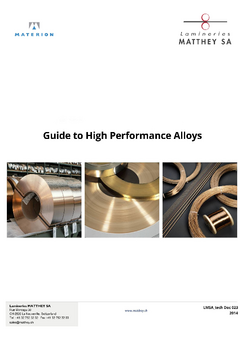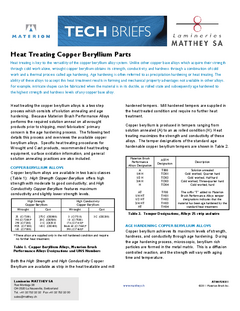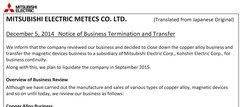Metals and alloys for medical applications
We are involved in the development of medical technology and we deliver high quality materials required of this industry. The materials used for implants and medical instruments are martensitic and austenitic steels, cobalt based alloys and titanium. Lamineries MATTHEY, through their large stock and proven logistics, is able to supply most medical grade alloys within short lead-times.
Stainless Steels
Austenitic Stainless Steels
Grades for implants:
- 1.4441 (X2CrNiMo18.14.3, DIN 1.4441, ISO 5832-1, ~AISI 316LVM, ASTM F138-F139, UNS S31673). A vacuum arc remelted, low carbon, high nickel and molybdenum version of Type 316 which has been used in surgical implant devices. The chemistry modifications are designed to maximize the corrosion resistance of this alloy and provide a ferrite free microstructure. Meets the requirements of ASTM F138 Grade 2, ASTM F139 Grade 2 and ISO 5832-1 Composition D.
Grade for medical instruments:
- 1.4310 (X10CrNi18-8, DIN 1.4310, ~AISI 301): The most widely used stainless steel for the production of springs. It reaches very high mechanical strength through cold working. Its austenitic structure is rather unstable and its corrosion resistance is lower than, for example, that of the 1.4435, 316L, or of the 1.4301, X5CrNiMo 18-10. An increase of the mechanical strength of the 1.4310, X10CrNi18-8, by more than 250 N/mm2 can be achieved by tempering at 280 to 420°C after having been highly cold worked.
- 1.4310.4 (X10CrNi18-8, DIN 1.4310, ~AISI 301): Lamineries MATTHEY SA proposes a special version of the 1.4310: the 1.4310.4. Its chemical composition has been adapted in order to increase the reaction to work hardening (Ni content between 6.4 and 6.6%). 1.4310.4 is also specially cast in order to avoid unwanted inclusions. Its austenitic structure is unstable and a high mechanical strength can be reached, using a significantly weaker rate of cold deformation than is the case for the conventional 1.4310. The stainless 1.4310.4 also offers an improved fatigue strength limit as well as a higher increase of the tensile strength after tempering than with the conventional 1.4310. These properties make the 1.4310.4 highly suitable for demanding spring applications
- 1.4404 (X2CrNiMo17-12-2, DIN 1.4404, ~AISI 316L): The Grade 1.4404 is widely used in the chemical industry. The presence of molybdenum in this grade enhances the resistance to chlorides, sulphuric acid and organic acids.The corrosion resistance of the 1.4404 is higher than these of AISI 301 or 302.
- 1.4435 (X2CrNiMo18-14-3, DIN 1.4435, ~AISI 316L): The Grade 1.4435 is widely used in the chemical industry, it can often be found on the market with the supplement "Balser Norm 2 (BN2)" and its relevant regulations. The significant presence of molybdenum in this grade enhances the resistance to chlorides, sulphuric acid and organic acids.This is the reason that stainless steel 1.4435, 316L, X2CrNiMo18-14-3 is often the best choice for applications demanding excellent corrosion resistance.With an increase in the content of an austenite element such as nickel, the formation of δ-ferrite in the microstructure is reduced or completely eliminated.
Cobalt based Superalloys
Grades for implants:
- Phynox (aka Elgiloy*) is an austenitic cobalt-based alloy (40%Co, 20%Cr, 16%Ni et 7%Mo) strengthened by cold work and capable of additional hardening by aging. Its Ultimate Tensile Strength (UTS) can reach more than 2500 N/mm2. Soft annealed temper is achieved by annealing at high temperature (1000-1200°C) followed by rapid cooling. In this temper, its UTS is only approximately 900 N/mm2 but the mechanical strength of Phynox increases significantly with cold rolling and its UTS can reach more than 1900 N/mm2 only by cold working (rolling). Additional strengthening can be obtained by age hardening at 520°C (3h), for example. The influence of aging is negligible in the annealed condition, but increases significantly with the degree of cold working. Phynox is non-magnetic, extremely resistant to corrosion (not sensitive to corrosion by organic acids), and its behavior in inorganic acids is greatly superior to that of the best stainless steels. Phynox presents an excellent passivity in contact with human tissues (bio-compatibility). Phynox has the ability to be used over a very wide range of temperatures, from 4.2K (liquid helium) to about 500°C. Thanks to its high Young modulus (210kN/mm2), its very high yield strength, (sometimes > 2200 N/mm2), and its good fatigue strength, Phynox has exceptional spring properties. Lamineries MATTHEY SA delivers Phynox strips according the following standards: ASTM F-1058 (surgical implants), ISO 5832/7 (surgical implants), AFNOR NF S 90-403 (surgical implants), AMS 5875, AMS 5876 and NACE MR0175.
*Elgiloy is a registered trademark of Elgiloy Specialty Metals.
Titanium
Grades for implants:
- Ti - Titane Grade 2 / ASTM F67 / ISO 5832-2 / R50400 / ~3.7035 / T40.Titanium Grade 1 or Grade 2 are the highest purity grades commercially available. The mechanical properties of titanium are greatly influenced by oxygen, nitrogen, hydrogen and iron. They increase the material's hardness, tensile strength and yield stress while simultaneously reducing elongation. Additionally, hydrogen triggers embrittlement that's its amount is kept as low as possible. Pure Titanium Grade 1 and Grade 2 contain low oxygen, hydrogen and iron levels, producing the most formable grade of the four ASTM commercially pure grades. It exhibits excellent corrosion resistance in highly oxidizing to mildly reducing environments, including chlorides. It has good impact properties at low temperatures. In addition, Titanium Grade 1 or Grade 2 can be easily welded, machined, cold worked and hot worked. Lamineries MATTHEY SA can deliver cold-rolled products in titanium for medical Applications, respecting ASTM F67 and ISO 5832-2.
Metals and alloys for medical applications
| Superalloys | Technical file |
|---|---|
| MP35N® - R30035 / ASTM F562 / ISO 5832-6 |  MP35N_v25E.pdf
MP35N_v25E.pdf |
| Phynox® - CoCr20Ni16Mo7, DIN 2.4711, ISO 5832-7, ASTM F1058, R30003 / R30008 |  Phynox_v25E.pdf
Phynox_v25E.pdf |
| Stainless steels | Technical file |
| 1.4310 - Stainless steel / X10CrNi18-8 / ~ AISI 301 |  1.4310_v22E.pdf
1.4310_v22E.pdf |
| 1.4310.4 - Stainless steel / X10CrNi18-8 / ~ AISI 301 |  1.4310.4_v22E.pdf
1.4310.4_v22E.pdf |
| 1.4401 - Stainless steel / X5CrNiMo17-12-2 / ~ AISI 316 |  1.4401-316_v22E.pdf
1.4401-316_v22E.pdf |
| 1.4404 - Stainless steel / X2CrNiMo17-12-2 / ~ AISI 316L |  1.4404-316L_v22E.pdf
1.4404-316L_v22E.pdf |
| 1.4435 - Stainless steel / X2CrNiMo18-14-3 / ~ AISI 316L |  1.4435-316L_v22E.pdf
1.4435-316L_v22E.pdf |
| 1.4441 - stainless steel (implants) / X2CrNiMo18-15-3 / ISO 5832-1 / ASTM F139 |  1.4441-316LVM_v22E.pdf
1.4441-316LVM_v22E.pdf |
| Other specialties | Technical file |
| Ti - Titanium Grade 1 / ASTM F67 / ISO 5832-2 / 3.7025 / R50250 |  Titane-Gr1M_v22E.pdf
Titane-Gr1M_v22E.pdf |
| Ti - Titanium Grade 2 / ASTM F67 / ISO 5832-2 / R50400 / ~3.7035 / T40 |  Titane-Gr2M_v22E.pdf
Titane-Gr2M_v22E.pdf |




